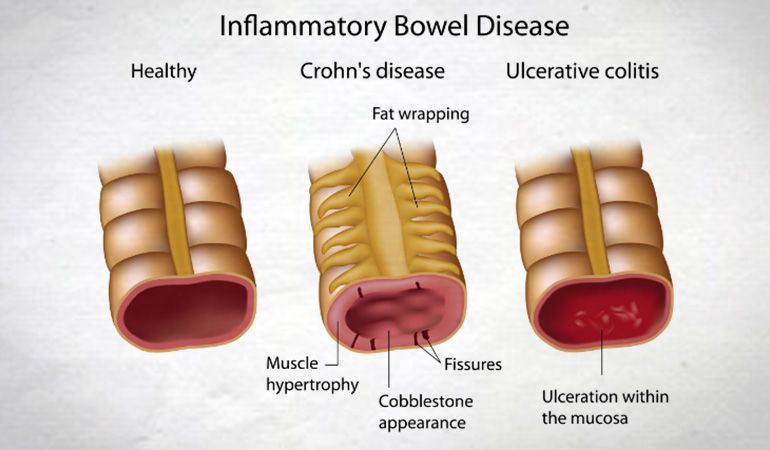108 Glen Osmond Road, Parkside

Crohn’s disease and Ulcerative colitis are collectively known as inflammatory bowel disease (IBD). Both conditions affect the bowel, but in slightly different ways. Crohn’s disease causes inflammation of the full thickness of the bowel wall, in any part of the digestive tract from the mouth to the anus. Ulcerative colitis is inflammation of the inner lining of the large bowel (colon and rectum).

More than 75,000 Australians have one of these conditions. They usually begin in people aged between 15 and 30 years, but can start at any age. Crohn’s disease is becoming much more common in children under the age of nine.
Causes of Ulcerative Colitis and Crohn's Disease: The exact causes of ulcerative colitis (the inflammatory bowel diseases (IBD)) is not known, but there are several theories. Ultimately, scientists believe that there is more than one cause and that several different factors work together to cause the disease.

Symptoms of Ulcerative Colitis and Crohn's Disease :
Ulcerative colitis and Crohn’s symptoms may develop gradually or come on suddenly. IBD symptoms worsen during disease exacerbations (also called flares) and may subside during periods of remission.
Gastrointestinal symptoms of IBD
Many symptoms of Crohn’s disease and ulcerative colitis overlap. In both conditions, abdominal pain and cramping, diarrhea, stool urgency (urgent need to defecate), and rectal bleeding are common. People with Crohn’s disease may also experience constipation, nausea, and vomiting. Those with ulcerative colitis may have blood in their stool.
General symptoms of IBD
Crohn’s and UC symptoms that occur outside the GI tract are known as “extra-intestinal manifestations.” People with Crohn’s disease or ulcerative colitis may experience fatigue, fever, night sweats, weight loss, and decreased appetite or loss of appetite. Depression and anxiety are common with IBD, as with all chronic illnesses.
Complications of IBD :
Ulcerative colitis is associated with complications both within the digestive system and outside the digestive system (which are called extra-intestinal symptoms).
Intestinal complications can include :
Extra-intestinal complications can include:
Ayurvedic View and Treatment Options:
Ulcerative colitis is known as pitta Grahani in Ayurveda, and according to Ayurveda, it is caused due to the accumulation of toxins and impurities in the body. It is a disease of pitta dosha, and a varying amount of Vata dosha is involved, too. Impurities and toxins (Ama) accumulate from food containing a large amount of pitta. When one eats the food that aggravates the pitta slowly makes a coating on the lining of the colon. This results in the immune system identifying it as a foreign material and attacking the colon, affecting both rakht dhatu (blood) and mamsa dhatu (muscles).

1. Avoid all types of milk and milk products. Curd/ yogurt and Ghee can be taken.
2. Limit the consumption of non-vegetarian food items.
3. Avoid consumption of coffee, tea, and ice cream.
4. Avoid all Pitta aggravating foods like spices, pineapple, lemons, tomato, and other citrus fruits.
5. Fruits good in UC are pomegranate, apple, papaya, guava, and banana.
6. Avoid Alcohol and smoking.
7. All leftover foods, spicy foods, salty and acidic foods, white sugar, pasta, vinegar, mustard, salty and acidic foods.
8. Avoid raw salads
9. Foods good to use in UC are old basmati rice, barley, moong dal, coriander, cumin, fennel, carrots, boiled potatoes, bottle gourd, ridge gourd, round gourd, green lentils, and black grams.
10. Consume plenty of water and coconut water.

Ulcerative colitis and Crohn's disease are painful conditions, but they can be healed with proper administration of Ayurvedic medicines that must be continued until the symptoms and irritation go away. If you wish to discuss further about your problem, you can consult Ayurveda doctors at Life Line Ayurvedic Herbal Clinic, Adelaide, SA.

Disclaimer : Sandeep Kumar and Anupam Vasudeva are not GP, they have Ayurveda medical degree from India where it is considered equal to any other medical degree. This qualification is recognized in Australia by vetassess governing body as Complementary Health Therapists. Life Line Ayurvedic Herbal Clinic does not claim to cure a disease or terminal illness and does not create any unreasonable expectation of beneficial treatment. Ayurvedic medicines and treatments are generally considered to be safe but rarely may be associated with possible adverse reactions in individual cases. We recommend seeking urgent medical attention in the case of an adverse reaction. This website provides you with information. You must contact your Ayurvedic or another health professional before you apply them. Read More